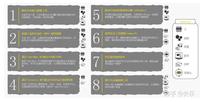
Mankind is poised midway between the gods and the beasts. --PlotinusThe 8th house invariably implies some degree of pa
Mankind is poised midway between the gods and the beasts. --Plotinus
The 8th house invariably implies some degree of pain, crises and suffering. Hopefully, in surviving these difficult times, we emerge renewed, cleansed, and wiser about ourselves and life in general. Having descended into the depths and somehow managed to find our way up again, an overview is gained which allows us to conceive of life as a journey and process of unfoldment. The fiery 9th house, naturally associated with Jupiter and Sagittarius, follows upon the troubled waters of the 8th and offers a broader perspective on all that has occurred up to now. Enough experience has been gathered to attempt formulating some conclusions about the meaning and purpose of our sojourn.
The 9th is the area of the chart most directly concerned with philosophy and religion – questions about the ‘whys and wherefores’ of existence. It is here that we seek the Truth, endeavouring to fathom the underlying patterns and basic laws which govern life. In one sense, the suffering incurred in the 8th compels us in this direction because pain is more easily borne if we can envision some purpose for having to endure it. In addition, if suffering is in any way linked with a failure to live in accordance to the laws or truths of existence, then discovering and adhering to these guidelines might decrease the amount of pain we need incur.
Human beings seem to require meaning. We apparently need absolutes, firm ideals towards which we can aspire, and precepts which serve to steer our lives. Without meaning, there is often the feeling that we have nothing to live for, nothing to hope for, no reason to struggle for anything, and no direction in life. Many psychologists believe that much of modern-day neurosis is related to a lack of meaning or purpose in life. Regardless of whether it is true or not, we are comforted by the belief that there is something greater ‘out there’: that a coherent pattern exists and that each of us has some particular role to play in that design. Whether it is ultimately up to us to create our own meaning in life or whether it is our task to discover God’s plan and intention, the search for guidelines, goals and a sense of purpose forms the crux of the 9th house.
The 9th house signifies what is known as ‘the higher mind’ – that part of the mind linked to the faculty of abstraction and the intuitive process – as compared to the concrete mind shown by the 3rd house. Mercury, the natural ruler of the 3rd and 6th houses, is a fact-gatherer; while Jupiter, the natural ruler of the 9th, denotes the symbol-making capacity of the psyche, the tendency to imbue a particular event or happening with meaning or significance. Facts are collected in the 3rd, but in the 9th conclusions are drawn from them: isolated facts are organized within the framework of a larger scheme of things or seen as the inevitable offspring of higher organizing principles.
While the 3rd and 6th houses are analogous to the analytical and compartmentalizing left brain, the processes associated with the 9th house (and the 12th) correlate to the activity of the right brain. The right brain can identify a shape which is suggested by only a few lines. The points are mentally woven together into a pattern. Synthetic and holistic, the right brain thinks in images, sees wholes, and detects patterns. As Marilyn Ferguson writes, ‘the left [brain] takes snapshots, the right watches movies.’
Ninth house
The 9th house often believes that events have a message concealed in them. Jupiter or Venus in the 9th, for instance, may give the feeling that everything that happens is ultimately positive and to one’s advantage, as if there were a benign Higher Intelligence at work guiding our unfoldment. Saturn or Capricorn in the 9th could have more difficulty perceiving meaning in an event, or else interpret the meaning in a negative light. Albert Camus, the French existentialist philosopher and writer, had Saturn in Gemini in this house: he believed that events have no higher or absolute meaning other than that which human beings attribute to them.
Placements in the 9th describe something about the style with which we pursue religious and philosophical issues, as well as suggesting the kind of God we worship or the nature of the philosophy in life we formulate. For example, Mercury or Gemini there may lead one to try and grasp God intellectually, while Neptune or Pisces predisposes one to embrace the deity through heartfelt devotion, to surrender the self. Mars suggests a dogmatic and fanatical approach to religious pursuits compared to the greater tolerance and flexibility exhibited by Venus in these matters. The God-image is also shown by planets and signs here. Saturn or Capricorn might conceive of a harsh, punishing, critical and paternalistic God, who must be obeyed at all costs. Neptune or Pisces in the 9th, on the other hand, envisions a compassionate and loving God, inclined to leniency and forgiveness.
The 3rd house rules the immediate environment and that which is discovered by exploring what is at hand. The 9th describes the perspective we gain standing back and viewing life at a distance. In this way, the 9th is linked to travels and long journeys. Travelling can be taken literally to mean journeys to other lands and cultures, or it can be understood more symbolically as journeys of the mind or spirit – the broadened horizons gained from extensive reading or the insights gained through meditation and cosmic reflection. Understood more literally, through travelling and mixing with people reared on traditions different from our own, our outlook on life is expanded. The taste and style of some cultures may appeal to us more than others, but nonetheless, other facets of the myriad possibilities of life are glimpsed and compared with our own. Travel enables us to view the world from a different perspective. I may be involved in a complicated relationship in London about which I feel confused and uncertain; yet, when I travel to San Francisco and reflect on this relationship, somehow the added distance of 6,000 miles helps me to understand it more clearly than when the relationship is right in front of me. The epitome of a 9th house experience might be the view of the world afforded the astronaut re-entering the Earth’s atmosphere. There, at a glance, is the whole picture – our planet seen as an entity in relation to limitless space. One’s ordinary, mundane and everyday concerns assume a different proportion after such an experience. John Glenn, the first American to orbit the Earth, had both Neptune and Jupiter in his 9th house.
Placements in the 9th designate the archetypal principles we encounter on our travels, and may even reveal something about the nature of the culture or cultures to which we are drawn. For instance, Saturn there may experience difficulties or delays on journeys, or travel more specifically for a practical purpose, such as work or study. Henry Kissinger, the American foreign ambassador under Nixon, has Capricorn on the cusp of the 9th, and Saturn, its ruler, in Libra, the sign of diplomacy. If Pluto or Scorpio is in the 9th, we may attract experiences in another country which profoundly transform us, or we may be drawn to a country with Pluto or Scorpio strong in its national chart. Admiral Richard Byrd, the first man to fly to the North Pole, had innovative Uranus in this house.
Returning much closer to home, 9th house placements indicate relationships with one’s in-laws. Just as the third house from the Ascendant describes our own relatives, the third house from the Descendant (the 9th) describes the partner’s relatives. Whether such relationships are cordial or stormy will be shown here. An in-law might reflect a planet in the 9th house or receive the projection of that principle. Some people with Jupiter in the 9th see the universe in a grain of sand, while others might perceive it in their mother-in-law.
Journeys of the mind are described in the 9th, which is also known as the house of higher education. The chosen field of study or the nature of the college or university experience in general is shown by placements here. For example, Neptune in the 9th may concentrate on a degree in art or music. However, that same Neptune could indicate confusion and vacillation in the choice of a course of study or disappointment and disillusionment during the stay at university. Uranus may rebel against traditional systems of higher education, or pursue a degree in some unusual or newly rising field, or be the first person to secure a place at Oxford at the age of seven.
The 1st house is ‘I am’ while the opposite house, the 7th, is ‘We are’. The 2nd is ‘I have’ and its opposite, the 8th, is ‘We have’. Correspondingly, the 3rd is ‘I think’ and the 9th is ‘We think’. The 9th describes thought structures which are codified on a collective level. These include not only the religious, philosophical and educational systems as already discussed, but also legal systems and the body of law. The 7th house is the lower courts, but the 9th represents the higher courts – the supreme law of the land which governs the actions of the individual within the broadest social context. In the 3rd, we learn about ourselves in relation to those in our immediate environment, but in the 9th a sense of our relationship to the collective as a whole is kindled. The 9th is also associated with the publishing profession, in which ideas are disseminated on a large scale.
Traditionally, planets in the 10th are associated with career and profession. The research by M. and F. Gauquelin, however, has established a correlation between certain planetary placements in the 9th and people who have achieved success in fields related to the nature of these planets. A discussion of these findings is found on page 95.
In the 3rd house, we examine that which is immediate and directly in front of us; in the 9th, we glimpse that which is not only farther away but also ‘up and coming’. Strong placements in this house confer an unusual degree of intuition and foresight – the ability to sense the direction in which someone or something is heading. The 9th house ‘tunes in’ to the pulse of a situation, quickly registering trends and currents in the atmosphere. Jules Verne, the science fiction writer with a remarkable gift for anticipating future discoveries, was born with Uranus in the 9th house. On one level, the 9th gives the prophet and visionary, while on another it denotes the public relations person, or the promoter intent on opening new vistas for others. Energies in the 9th can be expressed through the travel agent picking out ‘just the right holiday for you’; the entrepreneur confiding to you the latest sure-fire investment; the proponent of the most recent psychotechnology to hit town which promises instant enlightenment in one weekend; the coach giving his team a pep-talk before the big game; the tipster advising on the winning horse; or the artistic, literary or theatrical agent discovering the next big new talent.
In the 8th, we dug into the past and dredged up the remnants of our primordial and instinctual nature. In the 9th, we look to the future and what is yet to unfold. Depending on the planets and signs there and aspects to these, we may see a future full of hope and new promise or one in which the bogeyman lurks around the corner just waiting for us to be foolish enough to pass that way. In either case, it might be useful to reflect on something which St Catherine once observed, namely that ‘all the way to heaven is heaven.’









